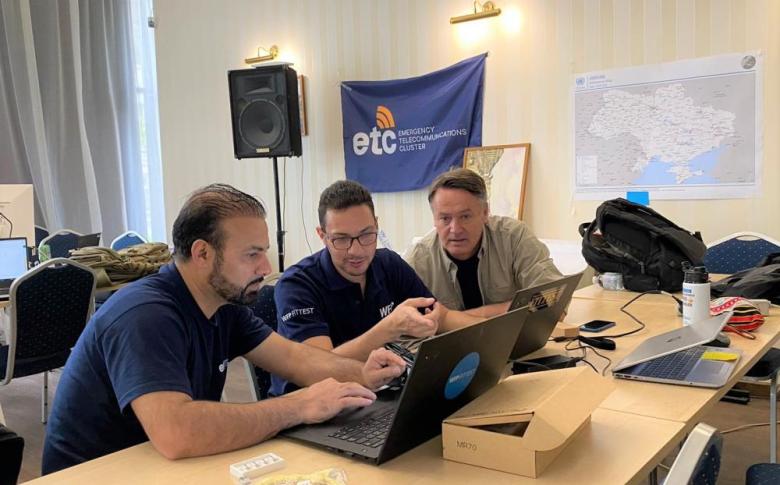Keeping watch over Ukraine’s humanitarian cyberspace

The Emergency Telecommunications Cluster (ETC) secure internet network in Ukraine keeps responders―and their information―safe from recurrent cyberattacks
Cyberspace―where much of us spend our time―is extremely vulnerable to attacks. In Ukraine, reports of cyber insecurity amid the conflict are rife. It is reported that the first month of active conflict saw three times as many cyberattacks against Ukraine’s information infrastructure compared to the same period in the previous year*.
Against this backdrop, it is critical to protect humanitarian responders from disruptive malware, network jamming and information breaches so they can focus on delivering lifesaving assistance to crisis-affected populations.
The WFP-led Emergency Telecommunications Cluster (ETC) provides a secure internet connection to the community of inter-agency responders in Dnipro and Lviv, two key operational locations in central and western Ukraine. More than 260 humanitarian responders from 12 UN agencies and INGOs have registered on the ETC connectivity network since the onset of the crisis.
“The loss of hours associated with network jamming can and is capable of jeopardizing the humanitarian operational response and effective coordination among frontline actors,” says Prakash Muniandy, head of the WFP Technology Division (TEC) in Ukraine.
Equipped to respond to cyber threats, ETC partner Cisco Crisis Response bolstered the cybersecurity set-up for the ETC secure network by providing vital expertise in technical design and equipment. Regular reports from Cisco on attempted cyberattacks to the network are pinged to the team in Ukraine almost daily.
“Although it’s impossible to 100% secure any network, our ETC network is mitigated against attacks of many kinds, protected behind a robust firewall,” explained WFP FITTEST’s IT Emergency Specialist Abdul Halim Yousufzai.
Invisible yet critical, the behind-the-scenes fight against cyberattack is 24/7.
Secure data solutions are crucial to all WFP TEC operations―and the people we serve within them. Currently, cash-based assistance is being delivered to over 700,000 people affected by the crisis across Ukraine, with plans to reach up to 1.5 million people by the end of the year.
Cash transfer platforms and tools used by WFP must be kept protected to ensure assistance safely reaches those who need it most.
“Cybersecurity is everyone’s challenge. Through an intensive campaign, WFP in Ukraine has been able to proactively contain and prevent any attacks on our networks, enabling us to save and change lives in a safe working environment,” said Leopold Happy, Senior TEC Officer.
The secure cyber solutions deployed in Ukraine are a key tool in the armour needed to prevent phishing attacks targeting humanitarian workers and the hacking of communications channels that are often a lifeline in emergency operations.
Armed with these cyber tools, humanitarian responders using the secure network in Ukraine can log in each morning amid the unfolding crisis knowing the flow of humanitarian data and information is safe and ultimately ensuring that assistance securely reaches affected communities across Ukraine.
----
* Державна служба спеціального зв›язку та захисту інформації України [State Service of Special Communication and Information Protection of Ukraine], “За місяць війни вже сталося майже втричі більше хакерських атак різного виду, ніж за аналогічний період минулого року [During one month of conflict, there have been almost three times as many hacker attacks as during the same time period last year],” Facebook, 3 April 2022.